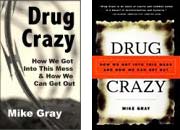Mark Kleiman in Another drug legalization pitch notes:
Esquire publishes yet another drug-leglization screed. Whoever does press relations for Law Enforcement Against Prohibition deserves a bonus.
Perhaps. I’m not going to speak to the salary level of LEAP’s press rep (although I’m happy to support a raise). But what’s interesting is the annoyance with the fact that, once again, legalization is being discussed as a serious policy debate (even though he pretends nonchalance by putting “yawn” in the title).
But Kleiman and his colleagues have not only opposed “legalization” (a somewhat odd thing, since Kleiman himself favors a form of marijuana legalization — the term seems to be more related to his obsessive fear of cocaine legalization and his dislike of “legalizers”), but as a group, they have often steered public policy discussion away from even including the discussion of legalization itself. Most references to legalization are snide comments about legalizers, or throwaway arguments that are completely lacking in evidence.
Now, in the case of the Esquire article, it’s interesting and useful to start having more of a discussion of what prohibition actually costs us in numbers of lives (as opposed to the merely anecdotally horrific). That doesn’t mean that I believe the full numbers in the Esquire article stand up to scientific rigor for accuracy (nor do I believe the author claimed it to be more than an attempt at rough number crunching).
For years, we have heard prohibitionists and their apologists toss out numbers that include things like prison and some pretty made-up “lost productivity” numbers as part of the costs to society of drug use, and few (other than legalizers) have stepped up to correct that (See James Roberts just last week at CATO: “Numerous studies have totaled up some of the costs to taxpayers and consumers from the current problems with drug addiction. These burdens on society — estimated at more than $180 billion a year — affect everyone.”). So a bit of hyperbole on the other side to make a point, while not my preference, seems reasonable.
Kleiman has some legitimate beef with the numbers used. Not all overdose deaths will end with legalization. But his “few hints” to get the reader started in demolishing the Esquire article go nowhere.
1. Alcohol – the drug we decided to legalize and regulate – kills about 100,000 people a year: several times as many as all the illicit drugs combined.
Could be. I don’t know. There are so many different numbers out there regarding alcohol deaths, it’s hard to sort through them. This undoubtably includes fatal car crashes where alcohol was a factor and may or may not have been a contributing factor. But regardless, I’m not sure what significance these rough numbers have to the argument. There’s not going to be 100,000 deaths a year from marijuana if it’s legalized. That’s certain. I can’t think of anyone who would dispute that. So merely legalizing and regulating any particular drug does not mean that it will automatically lead to the same actual lethality as alcohol. The 100,000 number gives us nothing meaningful to use in applying to any other drug.
2. The notion that there’s a set of taxes and regulations that would avoid creating a big illicit market while not increasing drug abuse substantially doesn’t pass the giggle test. (Licit pharmaceutical-grade cocaine costs about a tenth as much as street cocaine. So legalization means either a huge price drop or a set of taxes crying out for profitable evasion, and thus requiring enforcement.
As he’s done before, Kleiman here uses dishonest argument structure to create an unsupported conclusion out of thin air. Re-word that argument into its basic form.
Argument: Legalization means either a huge price drop, or a set of taxes crying out for profitable evasion, and thus requiring enforcement.
Conclusion: Thus, legalization means either a substantial increase in drug abuse, or a big illicit market.
Structure: A means either B or C, therefore A means either D or E. Nonsense.
He’s trying to get you to accept that a huge price drop is the same thing as a substantial increase in drug abuse a priori, and that a set of taxes crying out for profitable evasion is the same thing as a big illicit market. Cigarettes have a set of taxes crying out for profitable evasion, and yet the illicit market is negligible compared to the massive world-wide destructive drug prohibition market.
3. Counting all the overdoses as costs of prohibition would make sense – if no one ever died of alcohol poisoning or overdosed on prescdription drugs (often mixed with alcohol).
I agree. However, it’s nice to actually discuss the fact that many overdoses are costs of prohibition, and that ending prohibition could actually reduce the number of overdoses.
4. Yes, street gangs do some drug dealing. But it’s absurd to imagine that the gang killings would disappear if the drug market became legal.
Here Kleiman uses a combination of straw man and the nirvana fallacy. The article never claimed that all gang killings would disappear if the drug market became legal. In fact, they specifically chose to “lowball it” when coming up with the estimated portion that would stop with the end of drug prohibition.
Sometimes I think that the legalizers and the drug warriors have a secret arms control treaty, in which each side renounces the use of factually and logically sound arguments.
What does that mean? Particularly from one who is both a legalizer and a drug warrior, and who uses logically unsound arguments?
I know that Mark Kleiman is convinced that legalization of cocaine will immediately mean that roughly the same number of people using and abusing alcohol now will use and abuse cocaine (with no reduction in alcohol use or abuse) and that therefore we will have armageddon, because nobody can resist the allure of cocaine addiction. And that just isn’t true.
Legalizing cocaine doesn’t mean that it has to be in the alcohol model. There are many options that will make it possible for responsible adults to acquire safe drugs legally without having cocaine keggers and people selling 8-balls in every football stadium. In fact, much like we have dramatically reduced the number of cigarette smokers through education and public attitudes, it’s likely that there will be strong public attitudes directed against public cocaine intoxication. And there are many people who enjoy a drink who will have no interest in ever using cocaine.
Also, legalization is a complex interaction of various options and opportunities. Marijuana legalization will have an affect on the other drugs. Heroin will have its own model, different from cocaine and marijuana. Meth will probably be replaced by a pharmaceutical amphetamine (little blue pills). Most people will continue to use none of them, and many will use drugs but not abuse them. Some will abuse drugs and some will commit crimes, and we’ll be able to focus our limited resources on those last two groups (possibly being even more effective by being able to be swift and certain in our response (but more about that when I shortly review Kleiman’s new book)). The opportunities for rich discussions of public policy will be enormous.
Legalization is on the table. It is a point of discussion. It cannot be ignored or merely pushed off as so politically impractical to negate consideration. Those who would lead policy will have to be willing to have serious discussion about it, or they’ll be left behind.
There are lots of discussions for us to have, arguments to thrash out, policy differences to air, methods to consider, and that should be exciting.


 Michael Skinner, a law enforcement officer with the U.S. Forest Service in Colorado, said warning signs of possible drug trafficking include “tortilla packaging, beer cans, Spam, Tuna, Tecate beer cans,” and campers who play Spanish music. He said the warning includes people speaking Spanish.
Michael Skinner, a law enforcement officer with the U.S. Forest Service in Colorado, said warning signs of possible drug trafficking include “tortilla packaging, beer cans, Spam, Tuna, Tecate beer cans,” and campers who play Spanish music. He said the warning includes people speaking Spanish.